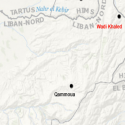Predicting the Rise of the Islamic State
Oct 2, 2014 - Institute for t...
ISW has predicted the rise of the Islamic State since 2012. Read our forecasts here.

ISW has predicted the rise of the Islamic State since 2012. Read our forecasts here.

The Islamic State of Iraq and al-Sham’s (ISIS) assault on the city of Mosul on June 10, 2014 demonstrated its formidable military strength. ISIS’s activities across Iraq and Syria also reveal that the organization is engaged in governance programs, ranging from Shari’a courts to aid distribution and law enforcement. These efforts underscore ISIS’s desire to erect a functional Caliphate within the boundaries of its controlled territory. That effort requires political and religious control in addition to military victory, and ISIS has a vision for how the Caliphate will form. ISIS has begun to explain its grand strategy to achieve this end through extensive public outreach, including a digital magazine series entitled Dabiq. This backgrounder will examine the contents of the first issue of Dabiq in detail, explaining the significance of this strategic messaging approach by ISIS in conjunction with the announcement of a Caliphate.
ISIS has sustained its campaign in the countryside of Deir ez-Zour province throughout its escalation in Iraq, indicating its continued prioritization of this military effort inside of Syria despite increased pressure from the regime.

The Syrian regime’s decisive victory over rebel forces in the Qalamoun stronghold of Yabroud, bolstered by support from Lebanese Hezbollah and Syrian National Defense Forces, has significant implications in the overall context of the three-year conflict.

Following the January 2014 uprising by rebel groups in Syria against the Islamic State of Iraq and al-Sham (ISIS), ISIS contracted its footprint in Syria.
Hezbollah’s deepening involvement in Syria is one of the most important factors of the conflict in 2013 and 2014. The impact of Hezbollah’s involvement in Syria has been felt not just on the battlefield, where the regime now has momentum in many areas, but also in Lebanon where growing sectarian tensions have undermined security and stability.